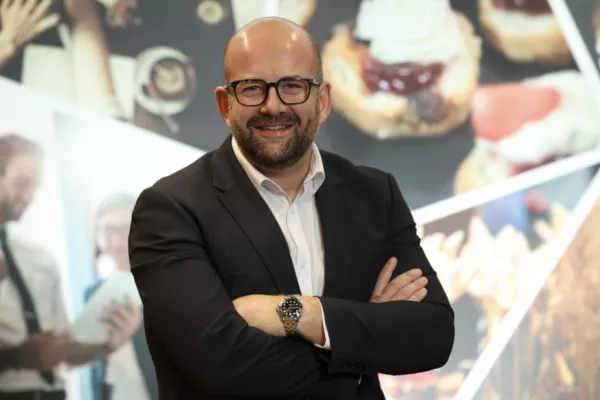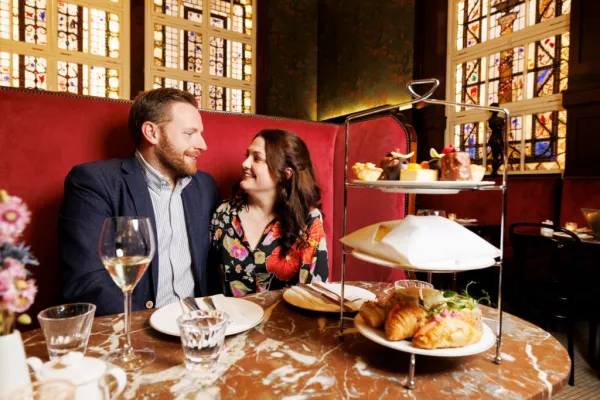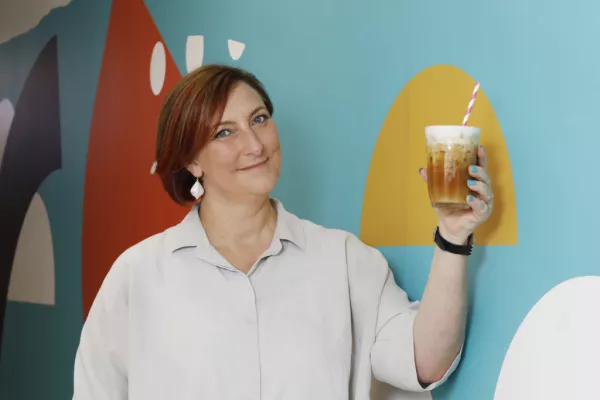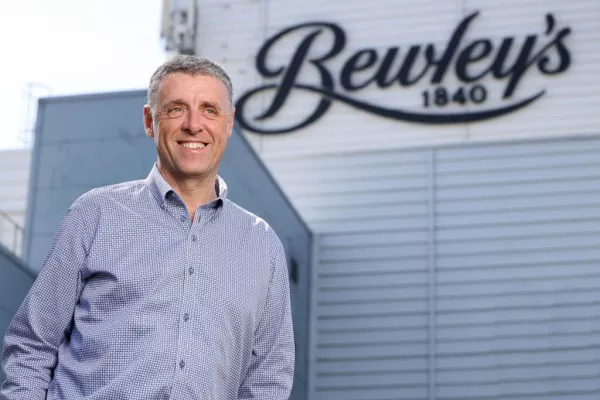JULIE MURRAY, Bewley’s new head of coffee culture for Ireland and the UK, talks to Hospitality Ireland about the focus of her role and the emerging trends within coffee.
This article was originally published in the Winter 2021 issue of Hospitality Ireland Magazine, in December of 2021.
Bewley’s recently announced the appointment of Julie Murray as its new head of coffee culture for Ireland and the UK. Julie will be responsible for building strong relationships with coffee farmers in Bewley’s network and telling their stories, both internally and externally, with a focus on driving a positive coffee culture. Her role will play an important part in Bewley’s focus on sustainability, from green coffee and its journey to cup, to working on implementing sustainable practices throughout Bewley’s business.
Julie, who has a diploma in food quality management from the Carlow Institute of Technology, has extensive experience in the coffee industry, having worked in the sector for over 30 years, serving as a barista and customer trainer, as well as holding product development and innovation roles for a host of independent and established coffee brands. She previously held a position in customer training with Bewley’s and left in 2006, to work with some of Ireland’s most successful independent coffee brands.
So, how did she first get interested in coffee?
“Years ago, when I was in college, I was waitressing, which I loved – I just loved talking to people and being around that buzz of a restaurant and food – and then I decided, OK, I’m off to Australia, to do the backpacking thing. There I got a job in a cafe, and they said, ‘Can you make coffee?’ so I said, ‘Of course,’ and I made a massive big milky cappuccino – that was what we did in Ireland back in the day. Nobody talked about taste then – it was all about how high you could make it, so I made a big Mont Blanc, with a frothy head, and I was proud of that, and they just looked at me and said, ‘No. You can’t make coffee for two weeks.’
“I was insulted, but curious, so I got trained in how to make coffee. Then I came back from Sydney and went back waitressing again, in Dublin, having a great time, living it up and partying all night. I was renting a house with a load of friends and just having a ball, and then my father sat me down and he was like, ‘All right, you – there are five things we want you to get serious about. We want you to learn how to drive, save for a mortgage, stop smoking, get a proper job, join a gym.’ It was the smack in the face that I needed.”
Beginnings
Serendipitously, Julie says, around the same time, someone she knew spotted an ad in the newspaper for a Bewley’s customer trainer and showed it to her.
“I said, ‘What’s that?’ She goes, ‘I don’t know, but didn’t you do coffee in Australia? And you get a car.’ I was like, ‘Sure, I can’t drive.’ That happened at around the same time that my dad had had his chat with me, and so I thought, maybe that’s the job I need to do. Maybe I do need to get a bit more serious.”
Julie applied for the job, got an interview, and then a second and a third interview.
“In the last one, Patrick Campbell was there. I had to try to impress him, and afterwards I thought, there’s no way I got that job – he didn’t smile for me once – so I thought, sod that.” In fact, she got the job.
“I started with Bewley’s in 1999. I worked with them for nine years, as a barista trainer at a time when there were no barista trainers in the country. People used to think when I said ‘barista’ that I was saying ‘barrister’. After nearly ten years there, I had my first child, and then my second child, and then I left. I found that I couldn’t face racing home in the car on the M50, trying to get back to crèche for 6pm.”
It was, Julie says, “a real juggle. My husband works in wine, so he works late nearly always. It was up to me to always do the crèche collections, so I handed my notice in at Bewley’s. I was like, ‘Here, I can’t do this, actually, any more. I can’t pay childcare. I can’t justify the commute.’ They tried to offer me three days, which was decent. At the time, I said, ‘Thanks, but no,’ and they said, ‘Look, we’ll never close the door.’ I don’t think I had heard that expression before, but the amazing thing is, here I am, 15 years later. The door was still open.”
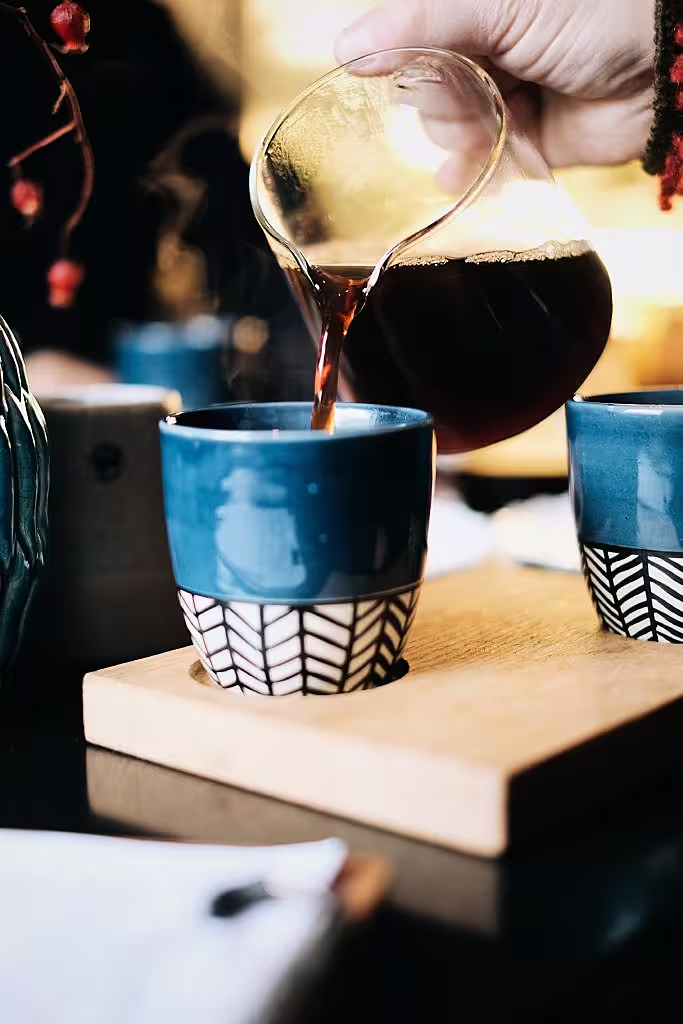
Training
So, did she take time off to be at home full time, with her children?
“I didn’t really ever stop,” Julie admits. “There were still almost no barista trainers in Ireland at the time, so I was getting calls from cafes and places saying, ‘By any chance, would you train our staff?’ So, I have my own consultancy for about six years. I ran that right through the Celtic Tiger times – and I was able to juggle it with children. I was able to work when I wanted to work. I was able to call all the shots, in terms of training. I had contracts with DAA, Kenco Coffee – I got great money. Then the Celtic Tiger days were over, and my youngest had started school.
“I did two coffee mornings with the moms, and I found that boring – it was just like talking about recipes and stuff. I just had a moment of revelation. I remember the exact kitchen I was in, and I remember going, ‘I have to go back to work – properly back to work,’ so I actually started working then as a barista three mornings a week. I was able to juggle, still collect the kids from school. I did that for a few years, and then I ended up setting up a coffee roastery with a group of guys, and then that went south, and then I set up another coffee roastery with a group of guys, and then that went. I’m unlucky, I guess!” she laughs.
The truth is, though, that – coffee roasteries aside – “I really consider myself incredibly lucky. I’ve had a long and lucky unplanned career in coffee, and speaking on behalf of women in coffee in Ireland …
… I’d say there aren’t many?
“There’s a load, but, actually, in terms of pay scales, often passion carries them too far. We all consider ourselves lucky to be working with a product that we are genuinely so passionate about.” So, what exactly does ‘head of coffee culture’ mean? “It’s a nice title!” she laughs. “It’s certainly one that I was curious about. I’d seen the ad posted on LinkedIn, and I clicked in and it said, ‘Email here for more info,’ and I didn’t have time. I just completely forgot about it, and then a mutual coffee person – a friend – said she had been asked to try and find somebody for the role, and she said, ‘There’s only one person in Ireland to do that, and it’s Julie Murray.’ So that’s how I got talking to Bewley’s, and, obviously, Bewley’s is a big heritage brand, and we are very proud of that, and I’m proud to be back working with Bewley’s.”
As for what it is, “I can tell you properly in a year’s time,” she says. “It’s a new role, and I have to try and carve it, which is great. I’d rather that than try and fill some boots. The way I envisage it is, if you imagine a cup of coffee on a table – right? – and scaffolding all around it. That scaffolding I’ve got to plan out with experiences and stories, and structure, and relevance – I have to try to build everything around that – and I have got to tell that story internally and externally. I have to ensure that the quality is there, all the way. I have to make sure that we correctly honour the products that we buy with a conscience. Our coffee now is Fairtrade, which is great and well and good, but I’ve got to learn more about that. I’ve got to go to the countries where we buy our coffee from and really drill down and dig down because I bang that drum with passion. I really do care about how fairly people are being treated. Farmers are more and more marginalised, farmers are getting less and less, while the in-betweeners are getting bigger and bigger and fatter and fatter. That’s not right.
“So, in terms of the coffee, purchasing, and green buying, I’ve got to learn a lot more than I do know currently, and that’s going to be great. Then I’ve got to ensure that there’s a dotted line through the business internally, first of all – everybody has a duty of care to the product, is the way I see it. So, whether it’s the guys who receive the big container-loads of coffee for delivery, that they are doing the very, very best that they can to ensure that the green coffee is stored correctly and it’s managed correctly, right through to the roasting, to the packaging, to the coffeecupping, which I’ve to do as well, and then dispatch and work with all of the trainers and the auditors, and then support marketing, and make sure that they’re not a runaway train, and that they understand coffee. So, the main thing is that coffee is at the heart of everything.
“I feel like, at the moment, I’m trying to be a sponge. I don’t fully have a voice yet, and I don’t fully have a clear idea of what I need to be doing – there are so many things that I can see where I can add value and help. At some point in the new year, I’ll sit down with the MD and go, ‘Right. Here’s what I think. Here’s what I see. Tell me what to focus on. Tell me what to not focus on. How can I drive it? How can I improve the quality?’”
So, Julie gets to create and shape the role as she learns it?
“Exactly.”

Moving On Five Years
What has Covid done to coffee?
“The general consensus is that people have moved on five years because of Covid. Because we were forced into a 2k zone and then a 5k zone, everybody would go to the horsebox up the road or down the road, and they were loving it because: a) it was open; and b) it was within their 2k or their 5k. At first, maybe, they were drinking the coffee, and the coffee that is served in horseboxes is, in general, quite specialty coffee. It’s a higher-graded green coffee – it’s usually a slightly lighter roast – and it has more of a fruity taste. To put it basically, people kind of got used to that taste profile, and at first, maybe they didn’t like it – they didn’t like the coffee that the horsebox down the road did – but they kept going there because it was a small guy trying to make a business through Covid times, and people gradually, without even realising it, have changed. So I think that’s one thing that Covid has done.
“There’s more of a buying-Irish consciousness on people’s radar. We really need to support our own economy, so I think more people are actively seeking coffee that is roasted here in Ireland, and not imported. I think that’s important. I have friends who used to swear by Lavazza – they liked fancy Italian coffees – but, actually, now they’re buying Irish coffee, and they realise that it’s fresher, so it’s going to taste better, and it’s supporting the economy.
“Since I left Bewley’s 15 years ago, it has just changed so much. What Bewley’s were really good at back in the day was sending us all off to these conferences that happened, either in Europe or in the States. We would go and be like a little army sent out to find information and bring it back. We’d go to the seminars – and the talks, and the workshops – and just soak up as much as we could learn about coffee and bring it back, and then we’d present on what we found. It was just so exciting.
“Now it’s all different, and I’m so envious of young people in the coffee industry because they can learn so much. It’s all at their fingertips. It’s so easy for them to learn. We had to really, really beg to be sent to Boston to the events, and we had to pay loads of money to go to the seminars to learn about the quality of water that’s needed for coffee, or whatever it is. There were a lot more hurdles for us to jump through, and now it’s just so easy, and there’s wonderful learning online – really great learning online there.”
Where does Julie see it all going? Are we going to reach a saturation point as a culture? Are we going to reach a point where we’re like, oh, we’re done. We don’t want to talk about this any more. Just give us coffee?
“No. I don’t ever think that’s going happen. The people on our sales team say that selling coffee is a solution, not a product. It can be made so many different ways.
“So many different people have a different connection with coffee, whether it’s a need for caffeine, or a social connection, or a geeky level of extraction of brewing. It occupies a whole emotional space in our lives as well. I don’t think we’re ever going to walk away from it. What I do think is going to happen is that coffee is going to get ever more rarefied. We know it’s getting more expensive. The price of coffee is rocketing.”
So that’s going to be a challenge?
“Yes. Because of Covid, production is way down at origin. There are the emerging markets of Asia and India demanding more coffee. There’s rust that is coating the leaves and depleting yield by 40% in Central America, so coffee is really getting more than expensive. Every coffee company is hitting customers with a price increase at the moment. It’s a really big communication piece for all of our sales side, to communicate why that is.”
In most places, coffee is now well into €3.50 zone, so will it start tipping towards the €4 mark?
“That’ll be here by next Easter.”
Will that start causing problems?
“Well, coffee is an affordable luxury. It’s one of those things that people, at this stage, cannot do without – right? – but, yes, it’s going to cause problems. Yes, there’s going to be a little bit of a loyalty divide. The first cafes to raise prices – people will give out and maybe boycott them, but everybody else will be doing it, too. It will have to happen. Otherwise, people’s livelihoods go, but what also needs to happen is that baristas need to be paid more than minimum wage, and how can that happen if the premises are taking a hit?”

Challenges
What other challenges and opportunities does Julie see over the next year or so?
“Well, price is the big one. At a geeky level, what I think is going to happen is that the top 10% of geeky people who buy coffee … there is a feeling that there’s going to be a growing cohort of people seeking more information about sustainability and about where their coffee is coming from. I think that’s going to be much bigger on people’s radar. There’ll be more focus on where exactly the coffee is coming from.”
Which is a positive thing overall?
“Yes. It’s often a difficult story to tell on a bag of retail coffee that you’d buy in a supermarket because there’s so much information to put onto a label. It’s a much easier story to tell if you’re being served by a barista, and they’re like, ‘Hey, the story behind this coffee is absolutely amazing!’ That’s a verbal exchange, and coffee suits that because it’s an emotive story. I think people will seek that more.”
Which, in turn, puts pressure on companies like Bewley’s to have those stories, to be able to tell them – to be proud of.
“Bewley’s has them in spades. Bewley’s has been buying direct for 20 years, having connections with farmers for years. It’s just that the story hasn’t been told in a meaningful way so far. It’s up to me to extract these stories as well, and see to the telling of them, whether we tell them on retail bags or we hold events and talk about them.
“I wouldn’t have accepted this role unless I knew there was an appetite for change. We know that Bewley’s is like a big steady ocean liner that’s chugging along, and if I can be part of the change to make it turn slightly to the left or the right, that will be wonderful.”
Read More: Hospitality Ireland Winter 2021: Read The Latest Issue Online!

